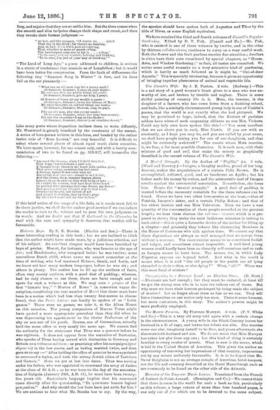Historic Boys. By E. S. Brooke. (Blackie and Son.)—There is
some interesting reading in this book ; but we are inclined to think that the author might have made more, by a judicious selection, out of his subject. An excellent chapter would have been furnished by boys of genius. Mozart, for instance, who was famous at the age of five; and Mendelssohn, who composed before he was twelve ; some marvellous Dutch child, whose name we cannot remember at the time of writing, who had mastered Hebrew, Greek, and Latin, and we know not bow many modern languages, before he was six ; and others in plenty. The author has to fill up the outlines of facts, often very scanty outlines, with a good deal of padding ; whereas, had be only chosen to nee them, there are facts enough and to spare for each a volume as this. We may note a propos of the first "historic boy," "Marcus of Rome" (a somewhat vague de- scription, considering the vast number of Marci that there must have been in a nation which had less than twenty first-names to choose from), that the Ferife Latime can hardly be spoken of as "Latin games." There were no games, we take it, at the Alban Mount on this occasion. The young companions of Marcus Verna might have quoted a more appropriate precedent than they did when he was deprecating his appointment to the titular Prefecture of the city on account of his youth. Drums, son of Germanicus, actually held the same office at very nearly the same age. We cannot find the authority for the statement that Titus was a qumstor before he was eighteen. It does not appear from the narrative of Snetonius, who speaks of Titus having served with distinction in Germany and Britain as a tribunus militant ; as practising after his campaigns (post stipenaia) in the law courts, and as having married twice, and then goes on to say :—" After holding-the office of quasstor he was appointed to command a legion, and took the strong Jewish cities of Tarichaaa and Gamete." Here we get at last into dates. Titus was serving under his father, who was appointed to command the army of Jadaaa at the close of 66 A.D. ; as he was born on the day of the assassina- tion of Caligula (January 21,th, A.D. 41), he must have been twenty- five years old. Suetonius's language implies that his command came directly after hia qamstorship, "Er qua:mane honore legioni prmpositus." And why should the law have been put aside for him ? We are anxious to hear what Mr. Brooks has to say. By the way, the speaker should have spoken both of Augustus and Titus by the title of Divue, or some English equivalent.


































 Previous page
Previous page